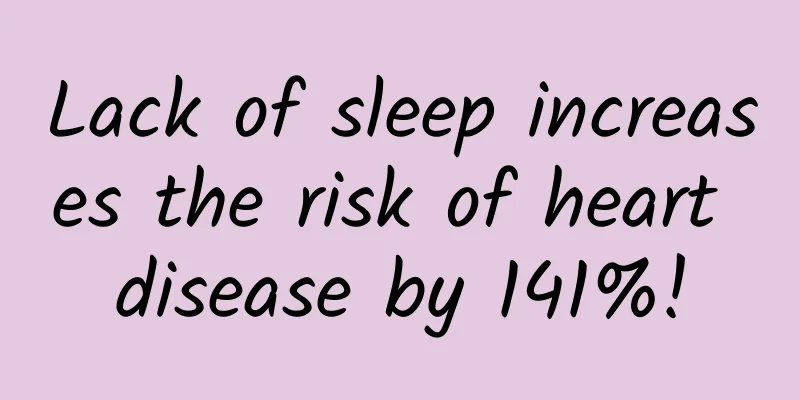Lack of sleep increases the risk of heart disease by 141%!

|
A study recently published in Scientific Reports found that poor sleep quality may damage heart health and increase the risk of heart disease by 141%. The study reviewed sleep data from 6,820 U.S. adults, with an average age of 53, who self-reported their personal sleep characteristics and heart disease history. Of the participants, 633 wore a research device (an actigraph) on their wrist to capture their sleep activity. The researchers looked at multiple aspects of sleep health, such as regularity, satisfaction, alertness while awake, sleep duration, sleep efficiency and sleep duration, and linked them to doctor-diagnosed heart disease. The researchers found that for each additional self-reported sleep health problem, the risk of heart disease increased by 54 percent. Among those who provided sleep data both through self-reporting and research devices, the increased risk of heart disease due to poor sleep health was much higher — a 141 percent increase, a figure considered more accurate. "These findings suggest that understanding a person's 'sleep health problems' is important for assessing heart disease risk. This study is the first to demonstrate that more sleep health problems may increase heart disease risk in middle-aged adults," said Soomi Lee, assistant professor in the USF School of Aging Studies and the study's lead author. "Those who provided both self-reported and monitored sleep data had a higher risk, suggesting that accurate and comprehensive measurement of sleep health is important for preventing heart disease." The research team asked participants about their health, including whether their doctor had confirmed they had heart disease such as arrhythmias, heart murmurs or an enlarged heart. High blood pressure was flagged as a risk factor for heart disease. They also looked at participants' family history of heart disease and sociodemographic factors such as race, sex, smoking history, depression and physical activity. The researchers found that while women reported more sleep health problems, men were more likely to have heart disease, but gender did not affect the overall correlation between the two factors. They also found that black participants had more sleep health problems and higher rates of heart disease than white participants, but the strong link between sleep health and heart disease did not change overall by race. Lee said that while sleep health is important for people of all ages, the team focused on midlife because it is a longer period and has more diverse life experiences and greater stress due to work and family roles. This stage is also when heart disease and age-related sleep problems begin to emerge. Because sleep health can be improved, the findings could help develop preventive strategies to reduce the risk of heart disease, the researchers said. Source: China Science Daily Author: Li Muzi Related paper information: https://www.nature.com/articles/s41598-022-05203-0 The pictures in this article with the "Science Popularization China" watermark are all from the copyright gallery. The pictures are not authorized for reprinting. |
<<: 22 satellites in one rocket! Long March 8 opens a new model of shared rocket "carpooling"
>>: Cooking food without heating it? It's possible...
Recommend
Why does the dragon raise its head on February 2?
This article was reviewed by Shao Lin, a popular ...
October marketing hotspot calendar is freshly released!
October is approaching, and the exciting National...
China's "compound eyes": tracking "uninvited guests" in space
If an asteroid hits the Earth one day, is it poss...
Detailed strategy | How to use resources to boost homepage traffic?
In this article, we will continue to talk about h...
23 operational promotion routines to obtain traffic for free!
What is the biggest headache for companies when d...
Operational Tips: How can a good product retain users?
Many bosses are very tired doing business. Why? A...
How to tell whether your mobile phone screen is good or bad? Teach you how to understand screen parameters
This article explains in detail what these six pa...
5 Laws of Strategy | Use the first one and you can ignore the other four
Before formulating a communication strategy, mark...
Are you overwhelmed by the choices when buying things for your children? Are you worried about safety? Parents must read this new regulation!
Children's cosmetics with heavy metal residue...
Why is it that the bigger the brand, the harder it is to gain influence?
Why does a brand become disliked by users once it...
Don't pick at these pimples! These pimples may be caused by a virus. Be careful, the more you pick at them, the more they will appear...
For small pimples on the skin Many people have th...
How do designers write a good mid-year summary? I have sorted out this basic framework!
“Why in the world does there exist such a thing a...
Secret and hidden for a hundred years! What did Newton write in his manuscript?
Text|China Science Daily reporter Zhang Wenjing I...
A complete event planning framework!
As an APP operator, you often need to plan activi...
Money psychology, teach you how to achieve financial freedom course video
Are you fanatically pursuing those low-priced pro...









